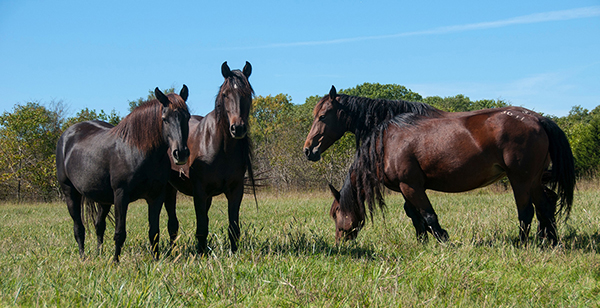Help Horses Avoid Heat Stress

Oklahoma is home to about 250,000 horses. (Photo by Todd Johnson, Oklahoma State University Agricultural Communications Services)
Oklahoma State University Department of Agricultural Sciences and Natural Resources
Weather is heating up fast in the Southern Plains, underscoring the importance for horse managers to review basic strategies that will help their equines avoid heat stress.
“Obviously, high environmental temperatures are a key concern, but prolonged or intense exercise and inadequate hydration may all contribute to heat stress,” said Kris Hiney, Oklahoma State University Extension equine specialist.
Horses, like humans, dissipate most of their excess body heat through sweating. Horses can sweat as much as 2½ to 3 gallons – 10 to 12 liters – per hour. Depending on the environmental temperature and the animal’s workload, it is possible for a horse to become dehydrated in as little as two to three hours. Furthermore, horses may not drink enough, even when provided water.
“Human sweat has fewer electrolytes in it than does our blood. When we sweat, the electrolyte concentration goes up in the blood – making us thirsty,” Hiney said. “Compare that to horses, which have either the same or more electrolytes. A horse’s blood does not increase in electrolyte concentration with sweat loss so the animal may experience a reduced stimulus for thirst.”
It is the responsibility of the equine manager to ensure the horse is drinking enough water to maintain good health and performance, and to back off the animal’s level of activity when needed, Hiney said. A good rule of thumb is to add the values of the temperature and humidity to get the heat index when determining whether to reduce animal activity.
Studies show horses will cool themselves normally – unless dehydrated or fatigued – if those combined values are less than 130. Conditions when the combined values exceed 150, such as 90 degrees Fahrenheit with 60 percent humidity, require more assistance in cooling. If the heat index exceeds 170, consider a different activity.
To enhance evaporate cooling, apply cool but not cold water to areas that have large blood vessels near the surface such as the inside of the legs and the neck, said Dr. Rosslyn Biggs, OSU Extension veterinarian and director of continuing education for the university’s College of Veterinary Medicine.
“Water temperature is key,” Biggs said. “Cold water can result in vasoconstriction which can limit blood flow to the horse’s skin. Continuous running water also has been shown to cool the horse faster. If a hose is available, keep applying water to the horse.”
Convection – heat that is lost due to air movement – is another major way that an animal loses heat. Supplying fans or keeping the horse in an area with wind flow is ideal. Fans with higher velocities provide more effective cooling.
Also, take advantage of conductive cooling, wherein a horse will transfer heat through space to any object cooler than it. For example, standing under trees allows a horse to radiate some heat to leaves, which are continually cooled by their own evaporation.
Long trips may require schedule changes to avoid the hottest time of day, Hiney said, and the muscle work of balancing in a trailer during a road trip can put an additional heat load on a horse.
For more information about horse care and best management practices, visit the OSU Horse site online. Video segments are watchable online through OState TV and OSU Extension’s award-winning agricultural television program SUNUP.
OSU Extension is one of two state agencies administered by the university’s Division of Agricultural Sciences and Natural Resources and is a key part of OSU’s state and federally mandated teaching, research and Extension land-grant mission.










